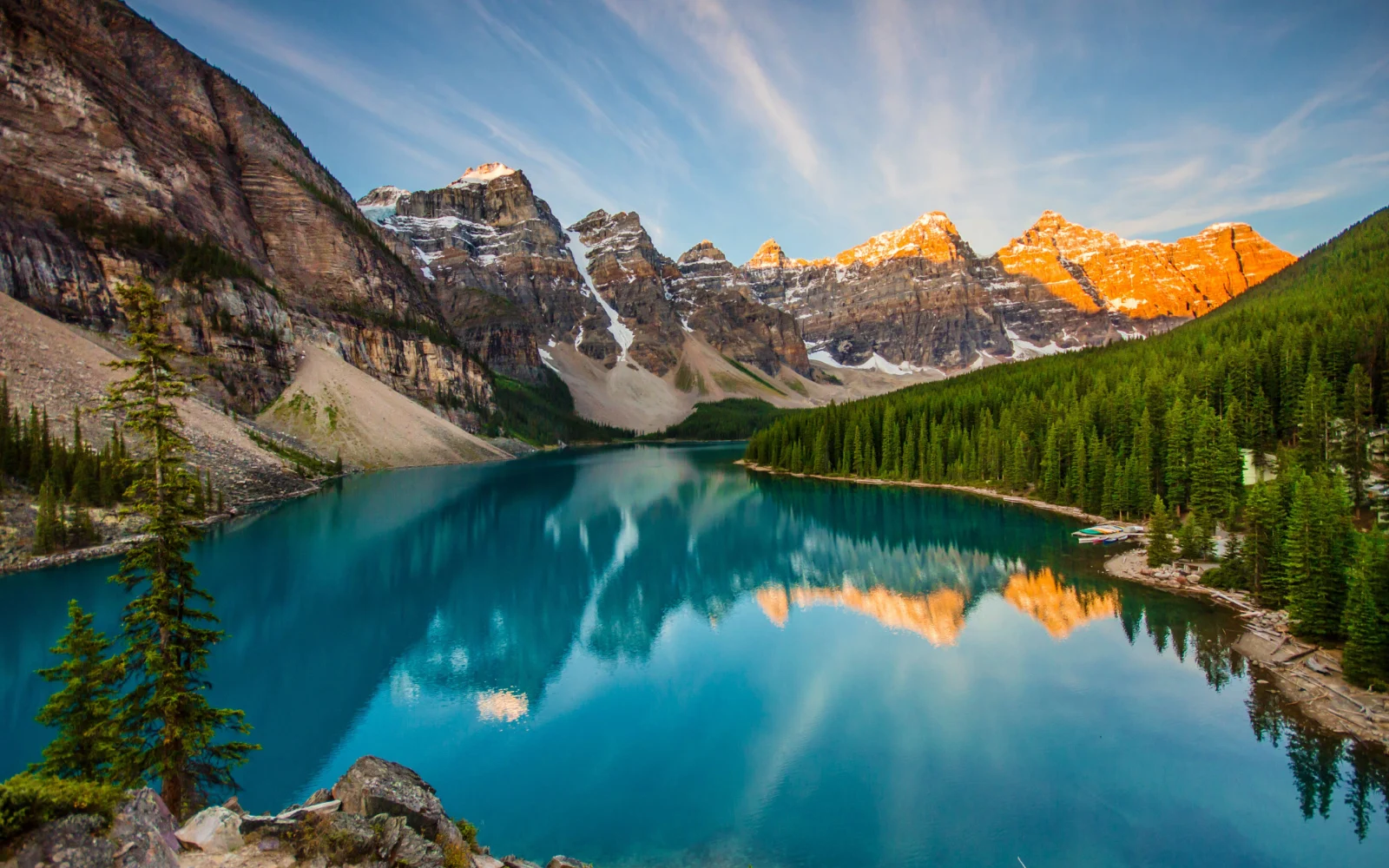What's the best time to visit British Columbia?
The best time to visit British Columbia is during the summer months of June to August when the weather is delightful, and there are numerous outdoor activities and festivals to enjoy. In Vancouver, the temperatures range from comfortable lows of 51°F to pleasant highs of 66°F.
You can take advantage of activities like whale-watching, surfing in coastal towns, exploring fascinating underground caves, and indulging in bird watching at picturesque locations.
If you’re looking for the best time to visit British Columbia, you’ve landed in the right spot. Whether you’re planning a short getaway or a longer holiday, this Canadian province has a lot to offer.
From scenic rides unlike anywhere else to a plethora of events throughout the year, British Columbia can live up to the expectations of every traveler and even transcend them.
Figuring out the best time to visit this Canadian beauty is just the start, though — finding out what you need to organize an itinerary based on your budget, travel preferences, and weather expectations is just as important.
Ready to dig in? So are we — let us be your guide!
The Overall Best Time to Visit British Columbia
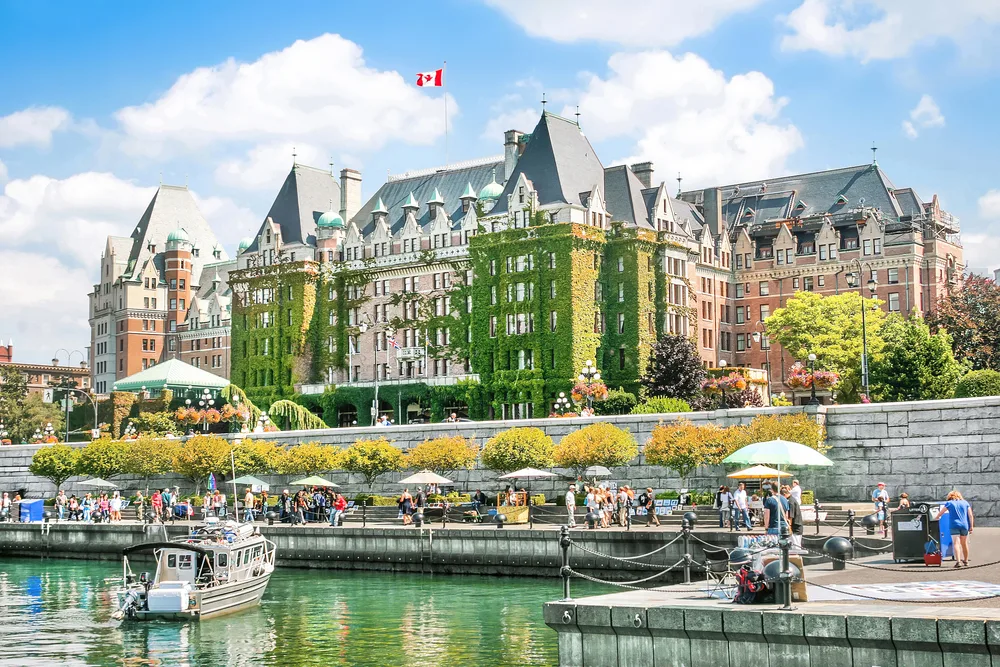
Canadastock/Shutterstock
The best time to visit British Columbia is in the summer (June–August). The weather’s great, the days are long, and summer festivals are running full stream.
In addition, dynamic adventures such as camping, hiking, cycling, or simply enjoying nature draw in plenty of visitors, so make sure to book your stay well in advance. In Vancouver, British Columbia’s largest city, temperatures vary between lows of 51°F and highs of 66°F.
While swimming isn’t on the table, you can always go whale-watching or try surfing (wetsuits can do wonders when it comes to keeping you warm) in Tofino, Ucluelet, Port Renfrew, or Nootka Island.
For a more laid-back experience, consider basking in the sun in the well-known Stanley Park if you end up in Vancouver, relaxing on some of the beaches along the Pacific shores, or exploring underground caves.
For the lattermost, here are our top suggestions: Cody Caves, Othello Tunnels, and Coral Cave.
Bird watching is a fun summer experience, too — just head to Rocky Point Bird Observatory, Swan Lake Christmas Hill Nature Sanctuary, Maplewood Flats Conservation Area, Boundary Bay Regional Park, and George C. Reifel Migratory Bird Sanctuary.
Popular summer festivals in this period include:
- Vancouver International Jazz Festival (June), a world-famous jazz festival, welcoming more than half a million guests each year;
- Concord Pacific Dragon Boat Festival (June), a fun event including primarily top-notch racing, accompanied by drinks, tasty food, music, visual art, and cultural performances;
- Crankworx (July), a dynamic mountain biking competition taking place on the Whistler slopes — you can watch or hit the trails yourself;
- Kamloops Powwow (August), an indigenous celebration marked by dancing, singing, and traditions, this festival is a must for August visitors looking to get insights into British Columbia’s cultural heritage.
Cheapest Time to Visit British Columbia
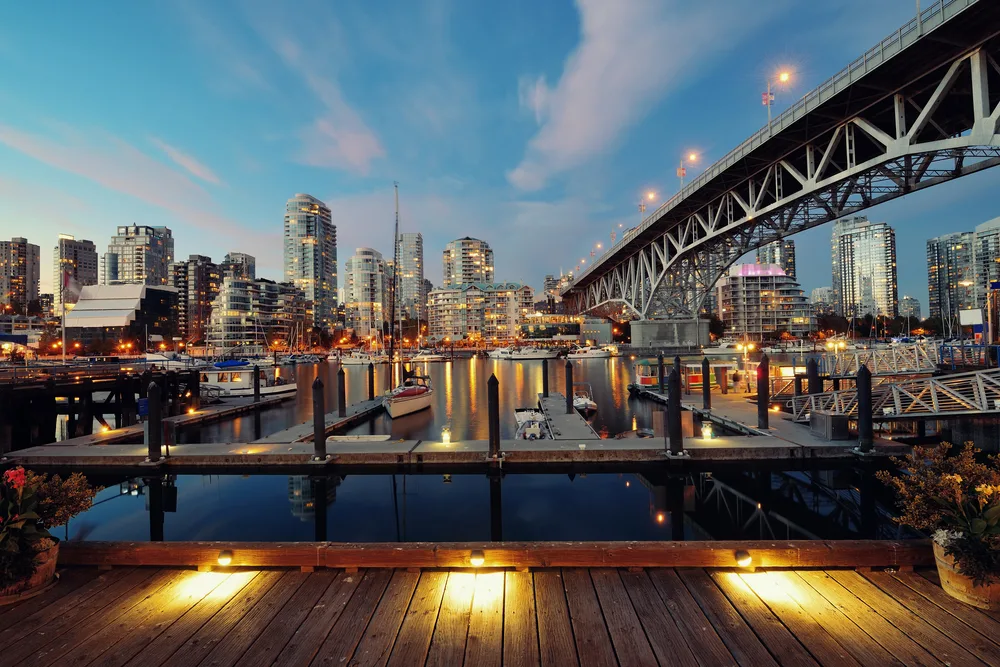
Songquan Deng/Shutterstock
The cheapest time to visit British Columbia is during fall (September–November). Prices are lower, and affordable lodging options are widely available. Although fall sees wet and chilly days, the scenic fall foliage and the interesting festivals compensate for it.
The season is ideal for paying Okanagan vineyards a visit too. Wildlife-watching is a must for fall visitors, especially in Whistler and Vancouver Island.
Hiking is also great, as the trails lack the summer crowds and temperatures. Late-season camping can be a great way to go easy on your wallet, too — check out Bridal Falls, Nairn Falls, Twin Falls, Takakkaw Falls, and Englishman River Falls.
Events worth being on your radar at this time include:
- Victoria Classic Boat Festival (September), an event honoring sailing and power craft;
- Okanagan Fall Wine Festival (October), to honor the harvest season with over a hundred of wine-themed seminars, tastings, and dinners;
- Sunshine Coast Art Crawl (October), an interactive art show allowing visitors to mingle with the artists behind the memorable creations;
- Cornucopia (November), a Whistler-based food event and a treat for every visitor’s taste buds;
- Fraser Valley Bald Eagle Festival (November), inviting people to gaze at hundreds of eagles along Harrison River.
September, October, and November visitors should expect average lows of 41°F and highs of 61°F.
Least Busy Time to Visit British Columbia

Pierre Leclerc/Shutterstock
The least busy time to visit British Columbia is in spring (March–May). This season is ideal for those who wish to steer away from the large crowds and explore the province without the peak season madness.
Also, spring’s overall pleasant weather conditions support visitors in their outdoor endeavors, including kayaking, golfing, or hiking, to name a few.
That said, note that the weather may be somewhat unpredictable at times — sudden sunshine can get transformed into unexpected showers (sometimes even snowfall).
On the other hand, this is precisely what attracts many visitors to British Columbia — just imagine having the opportunity to go skiing, kayaking, and golfing, all on the exact day. These three months have average temperatures between 39°F and 58°F.
Those here for the spring events should mark their calendars for the following festivals:
- World Ski & Snowboard Festival (April), a yearly musical celebration, this festival combines skiing, music, snowboarding, contests, and partying in the Whistler ski resort;
- Brant Wildlife Festival (April), held every year in Parksville and Qualicum Beach, this festival honors the migration of more than 20,000 brant geese;
- Vancouver Cherry Blossom Festival (April), a cherry blossoms paradise for everyone looking to welcome spring, accompanied by concerts, cycling tours, and picnicking;
- Swiftsure Sailing Race (May), the largest race of its kind with more than 200 racing boats and 1400 crew members;
- Victoria Beer Week (May), a week-long festival held at numerous venues across Victoria, loved by both residents and guests alike.
Worst Time to Visit British Columbia
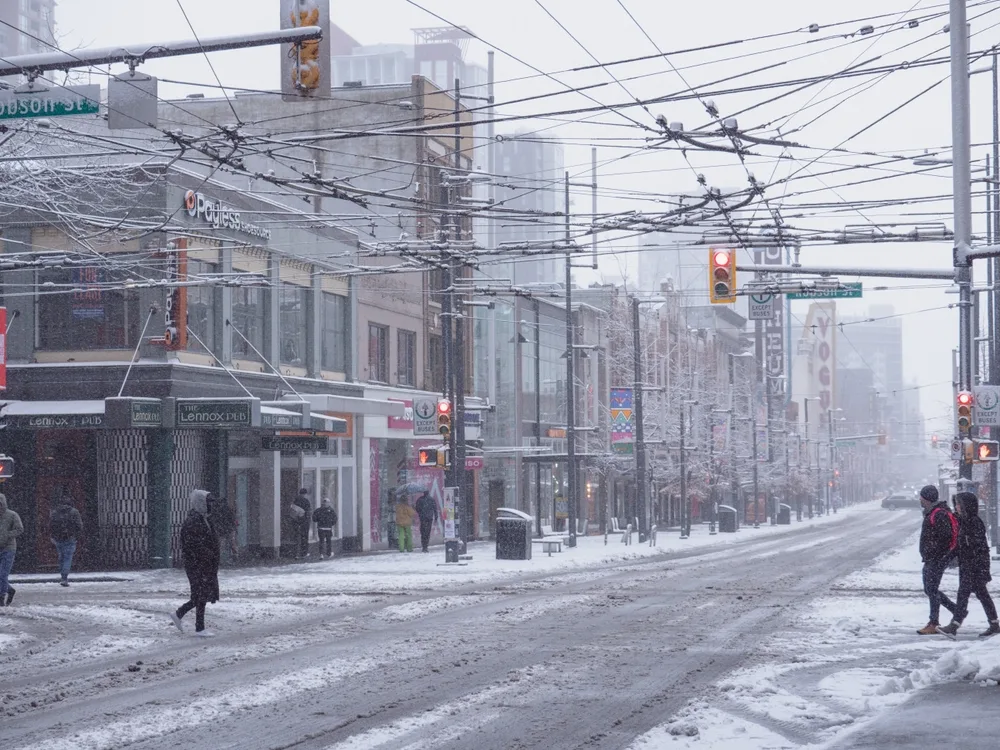
Vancouver, BC Canada – December 18, 2022: Snow in Downtown Vancouver/AlbertArt/Shutterstock
The worst time to visit British Columbia is in winter (December–February). Winter temperatures in Vancouver fluctuate between lows of 35°F and 42°F.
Unless you’re keen to engage in winter sports, the weather will put you off. Avid skiers should head to Kicking Horse, Fernie, or Whisler. If skiing isn’t your thing, try snowmobiling, dog sledding, or ice climbing.
Note that these months see many tourists, especially in the ski resorts.
The coastal regions occasionally see snow, but most of the time, there’s just rain. Luckily, visitors always have indoor activities to fall back on, be it a shopping spree or going from one museum to another.
Winter events worth attending include:
- Chinese Lunar Year (January/February), always known for its memorable festivities, including large parades, food, and street festivals;
- Rossland Winter Carnival (January), providing visitors with plenty of family-focused activities, such as snow slides, skating, and local delicacies;
- Vernon Winter Carnival (February), with more than 100 events and activities, such as contests, parades, sleigh rides, and ice sculpting, to name a few;
- Cariboo Cross-Country Ski Marathon (February), a haven for curious skiers and winter sports lovers;
- High on Ice Winter Festival (February), from ice carving to sleigh riding, this festival has everything you need for proper winter fun.
Things to Consider
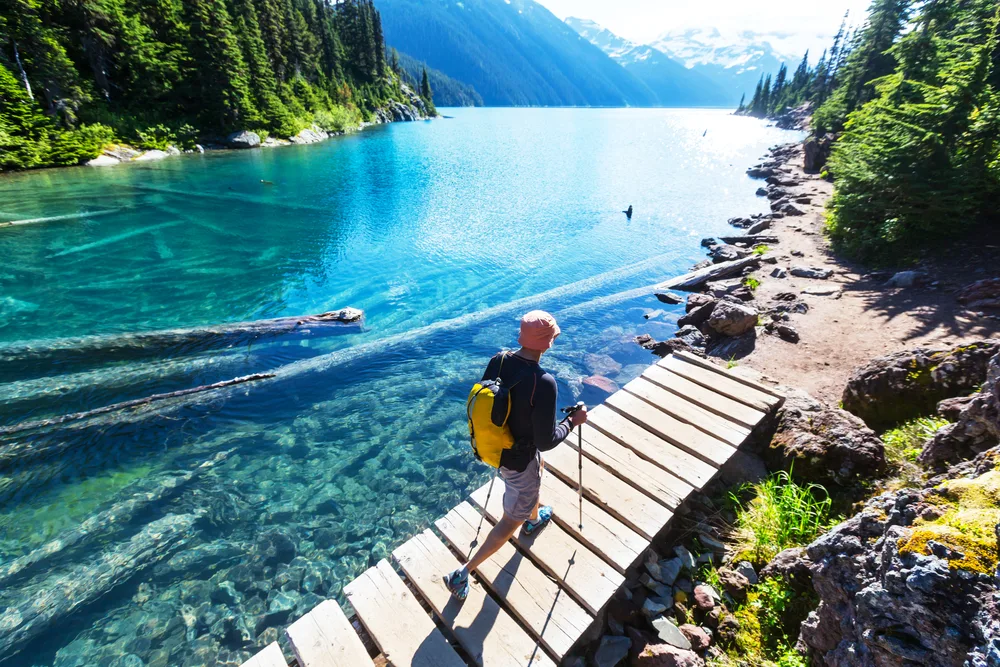
Galyna Andrushko/Shutterstock
We want you to have the best holiday possible, so we compiled several of our top British Columbia tips to make sure you have a whale of a time:
- While British Columbia’s currency is the Canadian dollar, many shops and restaurants may accept American dollars. That said, they offer bad rates, as they’re free to set their own exchange percentages. The verdict? Try paying in Canadian dollars as much as you can.
- Wear jackets or light sweaters in the summer, as the evenings can get quite chilly. Don’t blindly follow the weather forecast — the temperatures may be much colder than anticipated, especially after heavy rainfall.
- Pack hiking boots if you’re planning on exploring nature, and bring insect repellent.
- The best way to navigate the province is by renting a car. While certain cities such as Vancouver have a nicely developed public transportation system, only a rental will take you to the more rural areas and allow you to travel the province at your own convenience.
- The province sees very low crime rates, and tourist-directed accidents rarely occur. Still, we’d urge you to show common sense and look after yourself as you would anywhere you visit for the first time.
- Certain parks require visitors to obtain day-use passes. The most popular ones that do are Joffre Lakes Park, Golden Ears Park, and Garibaldi Park.
- If you visit Vancouver, make sure to get the Vancouver Attraction Passport, which works in two ways: as a city tour pass to access points of interest. The latter include: Capilano Suspension Bridge and Park, Vancouver Aquarium, and Bloedel Conservatory.
So, What’s the Best Time to Visit British Columbia?
| 👍 Best Time to Visit | June to August |
| 💲 Cheapest Time to Visit | September to November |
| 🗓️ Least Busy Time to Visit | March to May |
| 👎 Worst Time to Visit | December to February |
The best time to visit British Columbia is in the summer (June–August). The weather is in your favor, and visitors flock to the province to make the most out of the outdoor activities available.
To sum up, no matter when you visit British Columbia, it won’t be difficult to fill your calendar — pick an outdoor activity you resonate with, choose a tasty meal, or simply relax in nature.
So what are you waiting for? Start planning your Canadian getaway today. Happy travels!



